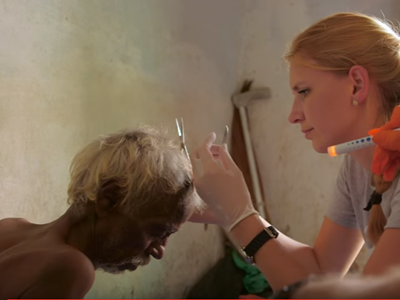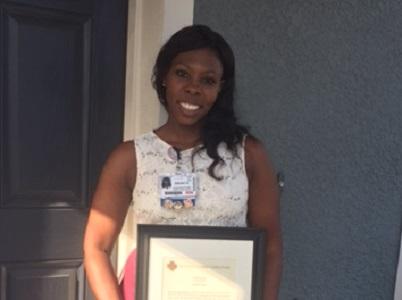Featured
Tags
Share
- Home / Blog / Faculty and Staff / Crusader for Tobacco Cessation
Crusader for Tobacco Cessation
Elizabeth Fildes, EdD, RN, CNE, CARN-AP, APHN-BC, DACACD, may be one nurse, but through her work, she’s helped improve the lives of thousands of people.
A professor in Chamberlain’s Master of Science in Nursing (MSN) degree program, Dr. Fildes founded the Nevada Tobacco Users’ Helpline in 1997 – a service that to date has served 40,000 people in their struggle to quit smoking.
Now she's bringing her expertise back to her native Philippines as a volunteer consultant for the country’s new tobacco users’ quitline.
Dr. Fildes’s interest in tobacco cessation was born from both personal experience and a belief in the potential of nurses to make a difference in the lives of others.
“My grandfather died of a tobacco-related disease in the Philippines when I graduated from high school,” she said. “There were no resources available to resuscitate a patient with myocardial infarction in my rural town in the Philippines — [making it] all the more important that we help patients prevent these consequences."
Later, after she moved to the United States and began working at the Department of Veteran Affairs (VA), she said, “I saw veterans who, in their old age, were victimized by chronic diseases related to tobacco use. I thought, it’s right that we start something here.”
These experiences helped sharpen Dr. Fildes' focus on helping people overcome their addiction to tobacco – a role that she feels is especially suited to nurses.
“I think it’s a great opportunity for nurses to demonstrate our ability to prevent disasters in people’s lives – the disaster of chronic debilitating disease. I think smoking cessation fits very well into the paradigm of nurses because we care for the whole person.”
The role of a tobacco users’ helpline
Tobacco helplines, such as the one Dr. Fildes helped establish in Nevada, provide free, accessible, phone-based support to people who are trying to quit smoking. Specially trained addiction counselors conduct a holistic assessment of the caller, explain strategies that have worked for other people and work with the individual to determine which techniques are right for him or her.
Counselors use motivational interviewing techniques to highlight the caller’s strengths and connect them with the process of quitting smoking. Follow-up phone calls help provide additional support.
In Nevada, helpline counselors address not only the physical and emotional components of nicotine addiction, but also the spiritual side.
“Not a lot of quitlines would ask about spiritual practices, but we do that,” Dr. Fildes explained. “We say, if prayer is part of your life, meditation is part of your life, these are very important tools that you can use in your quitting plan.”
Exporting the helpline to the Philippines
This holistic model is part of what Dr. Fildes has presented to health officials in the Philippines as part of her efforts to help establish a national quitline.
It’s come at a good time. According to a survey by the Philippines Department of Health, some 17.3 million Filipinos smoke – a figure that includes almost half of all men in the country. Among smokers, some 60 percent have stated that they are interested in quitting.
In a chance meeting in 2012, Dr. Fildes happened to be seated at a dinner at the same table as the Philippines Secretary of Health, Dr. Enrique Ona. He mentioned that the country was enacting a tax on alcohol and tobacco. She shared with him the idea of establishing a tobacco users’ helpline, to be supported by revenue from the tax.
“I said, ‘If you’re taxing the Filipino people, you need to offer them services to help them quit. I can help,’” she said.
In 2013, she formally presented the idea of establishing a national quitline to Dr. Ona and other health officials. She briefed them on the benefits of helplines and began sharing protocols and guidelines that had proven successful in Nevada.
The idea is now coming to fruition. The budget for the Philippines Tobacco Users Helpline was approved in February of this year, and the first employee was hired in March.
Hurdles still need to be overcome – including marketing the service and translating materials from English into some of the more prominent languages in the Philippines – but the new helpline is on its way. Once it’s fully implemented, it has the potential to help an untold number of Filipinos beat their addictions.
It’s quite an achievement, but in this and all of her tobacco-related work, Dr. Fildes takes a philosophical view of her role.
“I want to be a conduit of good that needs to happen in our world.”
By Danielle Logacho
More from Faculty and Staff
Request More Information
To receive the Chamberlain University Program Guide, including associated career paths, please select a program of study.







